It’s Friday, December 30th, 2011….and here’s The Gouge!
First up on the last edition in 2011, the Washington Examiner‘s Conn Carroll examines….
Santorum’s Dark Horse Advantage
Yesterday, CNN released a poll of registered Republican voters in Iowa showing that while Newt Gingrich is in utter free-fall, dropping from 33% earlier earlier this month to just 14% today, Rick Santorum’s support is surging, rising from 5% in the last poll to 16% today. The Washington Examiner‘s Byron York explains why this bump in support may be just the thing Santorum needs to pull off a surprise showing in the Iowa caucuses:
For months, Iowa social conservatives have searched for a candidate behind whom they could unite in their drive to stop Mitt Romney. But they were never able to come together behind a single choice. … There was one candidate that nearly all of them wanted to support, and that was Rick Santorum. But they had a problem with Santorum, too. That problem wasn’t about knowledge, or experience, or personal history. No, the problem with Santorum was always electability. Many, many social conservatives said that they wanted to support Santorum but were troubled by his inability to rise about two or three percent support in the polls. If Santorum could just show that he could rise a bit higher, they said, then who knows how much support might come his way?
If Santorum can unite social conservative support, and win more votes from Rick Perry’s 11% and Michele Bachmann’s 9%, then he will be within striking distance of Mitt Romney’s 25%. But RedState‘s Erick Erickson says Iowa social conservatives would be making a huge mistake in settling on Santorum:
Let’s remember Rick Santorum could not even win re-election in his home state of Pennsylvania. Rick Santorum also supported Arlen Specter over Pat Toomey in the U.S. Senate back in 2004. … He supported steel tariffs in Pennsylvania, which did him little good in his own re-election effort. He supported No Child Left Behind. He supported the prescription drug benefit. He supported the Bridge to Nowhere. … He voted against the Farm Bill in 2002, but he voted to extend milk subsidies to save the poor Pennsylvania farmer. … In the House, Santorum opposed NAFTA and offered legislation to impose steel tariffs. He wanted to tax imported honey and Chinese imports. … In other words, the Santorum I have observed for a decade is the Rick Santorum on the campaign trail now — a guy trying to have it both ways through too clever by half stunts like voting against the minimum wage while authoring a bill to raise the minimum wage so no one can pin him wn on his record.
Unlike Bachmann, Perry, Cain, and Gingrich, Santorum never had his moment in the spotlight. That may be his greatest advantage heading into the caucuses. Iowa conservatives have no idea how liberal his actual legislative record is.
Could be Pennsylvania voters knew….and cast their ballots accordingly. Look, we’re always somewhat suspicious of any single-issue candidate. And while we remain implacably opposed to abortion, Santorum, like a lot a people, somehow believe were we only able to overturn Roe v. Wade, abortion would become illegal.
No it wouldn’t. The issue would simply become the province of the states, where it belonged all along. And with the possible exception of the Dakotas, Mississippi and perhaps one, maybe two other states, it would remain legal, though in many cases thankfully more limited.
In any event, were Santorum to gain the least bit of serious traction, Mitt would immediately begin running ads highlighting every point Erickson raised….and this one-trick Pennsylvania pony would thankfully be put out to pasture.
Since we’re on the subject of people we’d love to see put out to pasture, the WSJ offers this commentary on….
Holder’s Racial Politics
The AG’s attack on voter ID laws may backfire legally and politically.
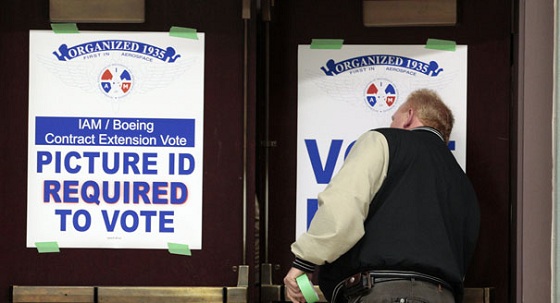 International Association of Machinists Members Vote on Boeing Contract Extension: They Must All Be White!
International Association of Machinists Members Vote on Boeing Contract Extension: They Must All Be White!
Eric Holder must be amazed that President Obama was elected and he could become Attorney General. That’s a fair inference after the Attorney General last Friday blocked South Carolina’s voter ID law on grounds that it would hurt minorities. What a political abuse of law.
In a letter to South Carolina’s government, Assistant Attorney General for Civil Rights Thomas Perez called the state law—which would require voters to present one of five forms of photo ID at the polls—a violation of Section 5 of the 1965 Voting Rights Act. Overall, he noted, 8.4% of the state’s registered white voters lack photo ID, compared to 10% of nonwhite voters.
This is the yawning chasm the Justice Department is now using to justify the unprecedented federal intrusion into state election law, and the first denial of a “pre-clearance” Voting Rights request since 1994.
The 1965 Voting Rights Act was created to combat the systematic disenfranchisement of minorities, especially in Southern states with a history of discrimination. But the Justice position is a lead zeppelin, contradicting both the Supreme Court and the Department’s own precedent. In 2005, Justice approved a Georgia law with the same provisions and protections of the one Mr. Holder nixed for South Carolina. In 2008, the Supreme Court ruled 6-3 in Crawford v. Marion County Election Board that an Indiana law requiring photo ID did not present an undue burden on voters.
A second case offers a further glimpse into the High Court’s perspective on the modern use of Section 5. In 2009’s Northwest Austin Municipal Utility District v. Holder, the Court declined to decide the question of the constitutionality of Section 5, writing that while it imposes “substantial federalism costs,” the “importance of the question does not justify our rushing to decide it.” But the Justices didn’t stop there.
They also cast real doubt on the long-term viability of the law, noting in an 8-1 decision by Chief Justice John Roberts that it “imposes current burdens and must be justified by current needs.” That such strong criticism was signed by even the Court’s liberals should concern Mr. Holder, who may eventually have to defend his South Carolina smackdown in court.
South Carolina Governor Nikki Haley tells us she “will absolutely sue” Justice over its denial of her state’s law and that challenge will go directly to federal district court in Washington, D.C. From there it may be appealed directly to the Supreme Court, which would have to consider whether South Carolina can be blocked from implementing a law identical to the one the High Court approved for Indiana, simply because South Carolina is a “covered” jurisdiction under the Voting Rights Act.
In such a scenario, Mr. Holder’s tactics could well doom Section 5 itself. That’s a big gamble for the sake of trying to stir up election-year minority voter turnout.
Civil-rights groups claim this Justice offensive is needed to counteract a voting environment in which little has changed since Jim Crow. But South Carolina’s law, like Indiana’s and Georgia’s, explicitly addresses potential disenfranchisement by offering state-issued IDs free of charge. When civil-rights groups fretted about the ability of minority voters to get to the local Department of Motor Vehicles to pick up a free state-issued ID card, Governor Haley created an 800 number to offer free rides to anyone who couldn’t afford the transportation. About 30 people called.
In October, the South Carolina Department of Elections reported that some 240,000 state voters lacked ID cards. The DMV now says more than 200,000 of those had allowed their IDs to expire, lived in other states or were dead. (You know….like Chicago, St. Louis, Detroit, Cleveland, etc., etc., etc. ad nauseum; which is why Team Tick-Tock is so keen on tanking the photo ID requirement!)
The Voting Rights Act was once needed to counteract the gap between black and white voter registration. By 2009 the gap had narrowed to a few percentage points in some covered states while blacks out-registered whites in others. Yet Justice retains a federal veto on election-law changes no matter how innocuous or racially neutral. Section 5 has become a vehicle not to pursue equal access to the polls but to play the grossest kind of racial politics.
As African-American men at the most exalted reaches of government, Messrs. Obama and Holder are a testament to how much racial progress the country has made. It’s a shame to see them pretending little has changed so they can scare up some votes.
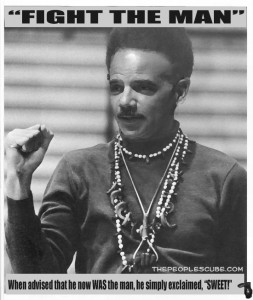
For more on the subject, we turn to Lachlan Markay, writing in Heritage.org….
Revisiting the Supreme Court’s Rebuttal of Voter ID Detractors
The Justice Department’s lawsuit against South Carolina has rekindled political war over state voter identification laws. While the merits of the suit will surely be hashed out in the political arena, the Supreme Court has in fact weighed in on the constitutional arguments offered by opponents of voter ID laws, and found them wanting.
In light of the issue’s prevalence, it’s worth revisiting that decision to see what the nation’s highest court had to say about voter ID laws.
Opponents of those laws usually make a pair of arguments against them: they claim the laws impose overly burdensome restrictions on voting, and that they are a solution in search of a problem, given the relatively low incidence of voter fraud. Neither of those arguments stands up to the Supreme Court’s thorough examination of the issue.
In the 2008 case Crawford v. Marion County Election Board, the court upheld an Indiana voter ID law, which the National Conference of State Legislatures classifiesas one of the strictest in the nation. The law requires voters to present a photo ID at polling places. Those who can’t may cast a provisional ballot, which will only be counted if the voter affirms the ballot in person – with a photo ID – within 10 days.
The Supreme Court upheld a decision by the Seventh Circuit Court of Appeals, finding that “showing a free photo identification is not a significant increase over the usual voting burdens, and the State’s stated interests are sufficient to sustain that minimal burden.” It’s also worth noting that prior to enacting the voter ID law, Indiana did charge for photo IDs. A provision in the law repealed that fee, presumably to rescind financial barriers to voting. Like Indiana, South Carolina offers free IDs to state residents.
The majority opinion, written by then-Justice John Paul Stevens – no conservative stalwart – examined each of the objections offered to this day in opposition to voter ID laws. Let us review each in turn.
Claim: Voter ID laws are excessively and prohibitively burdensome
Indiana provides a free identification card to any resident who requests one from the state’s Bureau of Motor Vehicles. Traveling to the BMV and requesting one, therefore, is the extent of the restrictions on voting.
Even voters who show up to the polls on election day without an ID, as mentioned above, can cast a provisional ballot, which will be counted as long as the voter visits the election board within 10 days of the election, and produces a photo ID or a valid objection to having one (indigence or religious belief).
The free IDs and provisional ballots mitigate any excessively burdensome voting restrictions, the court ruled. Voters who simply do not have an ID can easily obtain one: “the inconvenience of making a trip to the BMV, gathering the required documents, and posing for a photograph,” Stevens wrote, “surely does not qualify as a substantial burden on the right to vote, or even represent a significant increase over the usual burdens of voting.”
For certain classes of voters, however, those requirements may provide additional burdens. Those include the homeless, indigent, or elderly, and those with religious objections to being photographed. The law’s inclusion of provisional ballot exceptions, the court ruled, are ample to mitigate those restrictions. “And even assuming that the burden may not be justified as to a few voters,” Stevens added, “that conclusion is by no means sufficient to establish petitioners’ right to the relief they seek in this litigation” – namely, invalidation of the entire law.
Key to the court’s decision was the fact that the petitioners had not disputed the state’s interest in protecting the integrity of the voting process. Rather, they claimed that the law was a partisan attempt to restrict voters, to the advantage of state Republicans.
But “while the most effective method of preventing election fraud may well be debatable,” the court ruled, “the propriety of doing so is perfectly clear.” If the impetus for the law were partisan in nature – i.e., were unrelated to the electoral process – even the minimal burdens placed on voters would render the law indefensible. But the law was spurred by a legitimate concern – one that even its opponents could not dispute – and “the ‘precise interests’ advanced by the State are therefore sufficient to defeat petitioners’ facial challenge,” the court found.
Claim: Voter ID laws are unnecessary due to the relatively low incidence of voter fraud
The actual incidence of voter fraud in Indiana was only tangentially relevant to the validity of the law, the court ruled. While no evidence of fraud was included in the record by the respondents, “flagrant examples of such fraud in other parts of the country have been documented throughout this Nation’s history by respected historians and journalists,” including examples in Indiana itself.
It was therefore unnecessary for Indiana to show that the law responded to documented cases of voter fraud that it would attempt to prevent or penalize. The very real possibility that fraud could occur – demonstrated by the fact that it had occurred elsewhere – was sufficient rationale for the law.
A corollary to this line of objections from voter ID opponents is that the documented voter fraud cited by the laws’ proponents would not actually be prevented by a photo ID requirement – absentee ballot voting, for instance. But the court ruled that a 2003 instance of absentee ballot fraud in Indiana demonstrated that voter fraud of any kind “could affect the outcome of a close election,” and therefore supported the state’s case for the law.
Also worthy of consideration, the court noted, is the state’s real interest in protecting the perception of fair elections and voter faith in the integrity of state elections. “Public confidence in the integrity of the electoral process has independent significance,” the court ruled, “because it encourages citizen participation in the democratic process.”
That passage is key, since it establishes a rationale for voter ID laws that does not require that fraud be widespread. Efforts to avoid the perception of fraud or the belief that it could take place – both of which could discourage citizens from voting – are sufficient to merit the voter ID requirement.
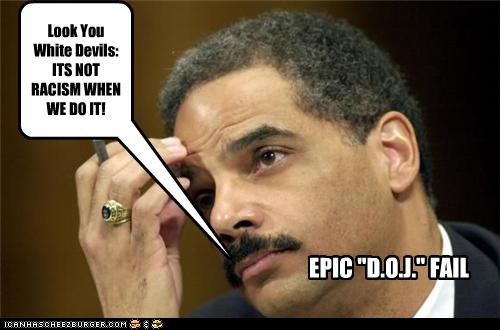
Here’s the juice: photo ID’s are an essential part of everyday American life, having already been deemed a necessary requirement for for airline travel, car rentals, check cashing and the purchase of a plethora of other goods and services….not to mention casting union ballots.
Any argument against similar requirements in the electoral process has nothing to do with the rights of minorities….and everything to do increasing the opportunity for voter fraud….a peculiarly Dimocratic concern!
Speaking of peculiarly Dimocratic concerns, Townhall.com‘s Kevin Glass offers the facts on one of the Left’s favorite fables:
An Uncomfortable Fact About Taxes: The Rich Do Pay Their Fair Share
There’s been a lot of consternation about the U.S. status as a “low-tax nation” in anticipation of serious debates about the debt and deficit. As far as taxes as a percentage of GDP go, the U.S. is relatively low-tax compared to developed European nations. However, the discrepancy doesn’t come from a lack of taxes on the rich – it’s that the U.S. taxes everyone else at pretty spectacularly low rates.
The primary driver of this is that the U.S. doesn’t have a VAT or some other form of consumption tax that generally raises a higher percentage of income from people who don’t have the luxury of being able to save and invest.
Clive Crook writes:
A new report by the Organization for Economic Cooperation and Development shows that in the middle of the last decade — i.e., after the Bush tax cuts were introduced — the U.S. income tax was about as strongly redistributive as income taxes in Canada, Denmark, Finland, the Netherlands and Sweden. You might have noticed that the CBO report on top incomes was widely quoted, but one finding got less attention: Between 1979 and 2007, “the federal individual income tax became slightly more progressive.”The awkward truth is that the U.S. income tax system is anomalous not because it taxes the rich lightly but because it taxes everybody else lightly… it’s wrong to say that the U.S. tax system has been rigged in favor of the rich.
This is a truth that Democrats who think that many problems could be solved simply by raising taxes on the rich need to grapple with. The way that other countries finance their large welfare states is not by gouging upper-income-earners, it’s by heavily taxing the middle class.
This is a point I’ve made before. Despite calls for higher taxes on the rich, the U.S. tax code is already remarkably progressive. To take the U.S. from its current tax state to a European place, they’ll need to raise a substantial amount of taxes from people no politician wants to touch.
The fact about taxes in the United States is that the rich do pay their “fair share,” unless “fair” is defined as a tax burden that doesn’t exist anywhere in the world.
Next up, the Environmental Moment, and a commentary from the WSJ detailing one small step for fiscal responsibility:
Ethanol in Winter
Wonder of wonders, the tax subsidy and tariff expire.
Congress created ethanol subsidies in 1978, expanded them in a 1980 bill, and then rinsed and repeated in 1982, 1984, 1988, 1990, 1992, 1998, 2004, 2005 and 2007. But now, wonderful to relate, this 30-year adventure in corporate welfare may finally be going into reverse.
Congress adjourned this month without extending the $6 billion annual tax subsidy for blending corn ethanol into gasoline and the steep import tariffs on the industry’s foreign competitors. Both turn into a pumpkin at the stroke of the New Year.
The Senate voted overwhelmingly against continuing the 45-cent-a-gallon ethanol credit in July, and an extension was not slipped into the final budget deal. Deliberate neglect is not the Viking funeral the ethanol lobby deserves, but given its many political clients this is a minor policy watershed all the same.
The left-right coalition against corn ethanol has been growing for some time, and the latest outfit to lend its voice to what is now a not-so-lost cause is none other than the National Academy of Sciences. In an October report, academy researchers concluded that grain ethanol “could not compete with fossil fuels in the U.S. marketplace without mandates, subsidies, tax exemptions, and tariffs . . . This lack of competitiveness raises questions about the use of government resources to support biofuels.”
The liberal revelation has been the growing evidence that biofuels increase net carbon emissions. Pumping energy-intensive row crops into gas tanks leads to land-use changes in world agricultural markets that increase greenhouse gases. (GASP!!!)
The irony is that a fuel that was sold as a global-warming palliative—the industry will use any argument to justify its government lucre—is now being hoist on its own corn stalk. Green carbon fuel standards regulations from the Environmental Protection Agency and in California credit sugar ethanol produced in Brazil with better climate benefits than corn ethanol.
So South American makers have been shipping their product to the West Coast, paying the tariff and selling it at a premium. U.S. makers then send their product south to backfill the Brazilian market. So much for “energy independence,” another example of false ethanol political marketing.
Ending ethanol protectionism will at least help lower U.S. costs, but the tragedy is that no one would ever buy it at the pump without Congress’s mandate, which, alas, will continue. The National Academy’s summary is apt: “Without biofuel tax credits . . . the cost of biofuel programs is borne directly by consumers, as they are forced to pay a higher cost for the blended renewable fuel than for petroleum-based products. Otherwise, consumers bear the cost of biofuel programs indirectly through taxes paid.”
The fight for economic rationality goes on.
Neither was Rome built in a day.
On the Lighter Side….
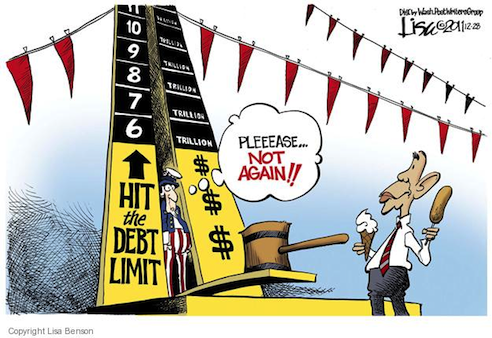

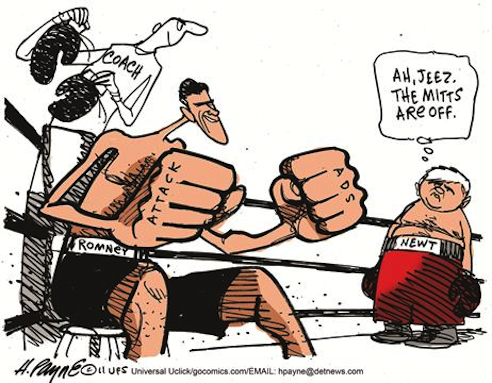
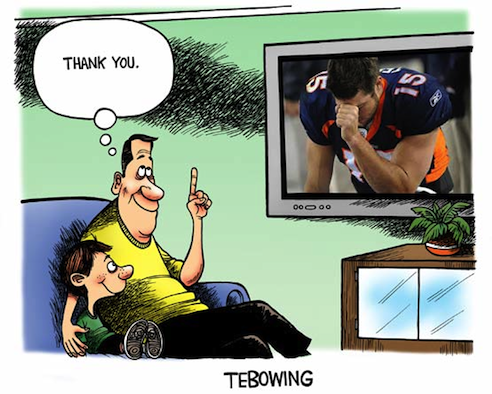
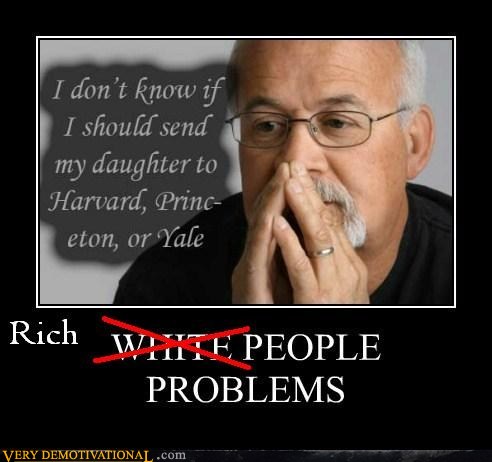
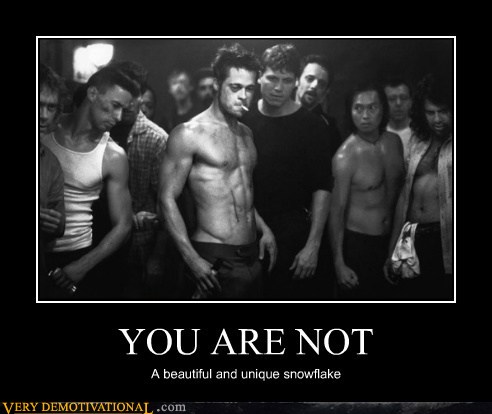
Finally, we wrap up the year with another first:
Pelosi Daughter Says Mom Wants to Leave Congress
For once, ONCE, Nancy and we agree!
Here’s wishing everyone a safe and prosperous* 2012; catch you in 2012!
Magoo
* Excepting of course Team Tick-Tock and the rest of the Dimocratic Party!










You must be logged in to post a comment.